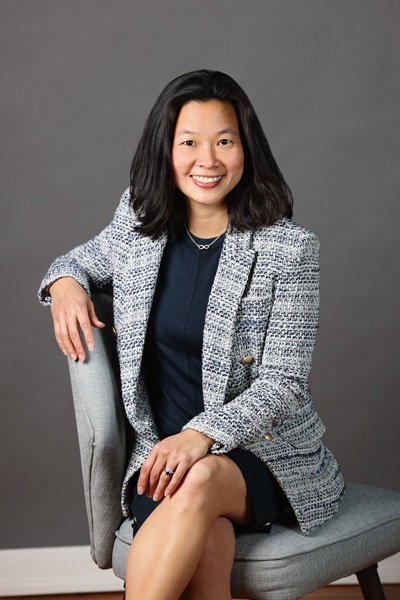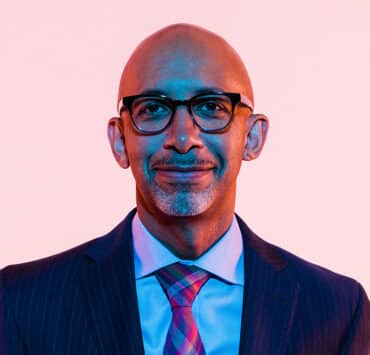Veronica Lei dreamed of becoming an assistant US attorney for years before landing a job at the US Attorney’s Office (USAO) for the District of Massachusetts. Despite long working hours and a brutal commute, she dedicated herself to the role—until her full-time nanny broke an ankle.
Suddenly without childcare, Lei and her husband reassessed their living situation. “Life changes,” Lei says. “We had two little kids and no family in Boston.”

The couple relocated to Indiana, where Lei joined major pharmaceutical company Eli Lilly as a litigation and legal compliance counsel. Since then, she has risen to become assistant general counsel and now leads a global team that handles privileged internal investigations. However, her struggle to balance work and motherhood has only increased with her in-house success. A year into the COVID-19 pandemic, that struggle remains at the forefront of her mind as she seeks to manage the often-competing concerns of working, parenting, and living through these times.
Before COVID and before children, Lei got her start as a Department of Justice program analyst after obtaining her bachelor’s degree from Columbia University. The role sparked her interest in law in general and federal prosecution in particular.
Five years out of Harvard Law School, Lei secured her then dream job. She spent over six years at the USAO, where she specialized in asset forfeiture. But not even the intensity of her working environment could have prepared her for the needs of a young family. “I worked every single minute that my kids were asleep,” she elaborates. “I was with them whenever they were awake, but the second that they went down for a nap, I was working.”
Still, Lei found her job at the USAO incredibly fulfilling. Just before 2015, Lei’s husband suggested moving back to his home state, Indiana, to be close to his mom. But Lei was hesitant—she agreed only to move if she found a job just as stimulating as her USAO work. A timely opening at Lilly fit the bill, and her discovery of a Mandarin immersion school for her boys was icing on the cake. They took the leap.
Beyond aligning with her expertise, the role at Lilly brought her to a company known for its support of working parents. Lei is quick to note that Lilly’s support doesn’t equate to shorter hours. “That is not what a company supportive of working parents does. Rather, the company gives parents the tools to take care of their kids so that they can work,” she explains. At Lilly, those tools include backup daycare days and flexible working hours that allow parents to adjust their schedules around expected, and unexpected, family obligations.
“Hopefully, supervisors and employers will continue to recognize the strain on the workforce of having to [be both a parent and an employee].”
When COVID hit, like most of her colleagues, Lei began working remotely from home. At first, she appreciated the time saved by no longer commuting or running back and forth to pick up her kids. Yet, as the pandemic dragged on, she noticed a shift. Formerly normal activities that required her to step away from her computer now receive warped reactions. There was an expectation for her to be constantly available, courtesy of COVID’s “new normal.”
“A lot of my colleagues and I want to go back to the office because we miss having boundaries between our work lives and our home lives,” says Lei. The two sides have bled together, leaving her caught in the middle.
In many ways, Lei has been lucky during the pandemic. She and her husband have remained employed, with the means to hire a sitter to help watch the kids. Even so, everyday logistics and household distractions occupy Lei’s mind both on and off the clock.
“The pandemic has gone on for so long that I don’t know if anyone cares anymore,” she admits, referring to the plight of working parents. “Hopefully, supervisors and employers will continue to recognize the strain on the workforce of having to do both.”
Recognizing the strain and minimizing it, though, are two different issues. Lei is torn between wanting to spend more time with her family and wanting to advance her career, especially as an Asian woman who could shepherd in greater leadership diversity. “If I climb higher, maybe it will become more normal to see someone who looks like me in a leadership position,” she says. “But I will never recapture that time with my kids.”
Lei sometimes feels guilty for divvying up the hours in her day. Still, she finds inspiration and optimism where she can. COVID shone a light on the difficulties faced by working parents, albeit by exacerbating those difficulties. Lei hopes that a greater level of understanding and flexibility will accompany the return of some much-needed workplace structure, as people remember what they learned about their colleagues while working from home.
Until work becomes less ubiquitous post-COVID, Lei will continue to carve out time for her family. She wants to be present in those moments with her kids, now seven and nine years old. “I still remember the bleary-eyed few weeks after having my firstborn,” she says. “I’ve never done anything harder in my entire life than taking care of that little person.”
As impossible as her current balancing act sounds, Lei has already overcome much more.


